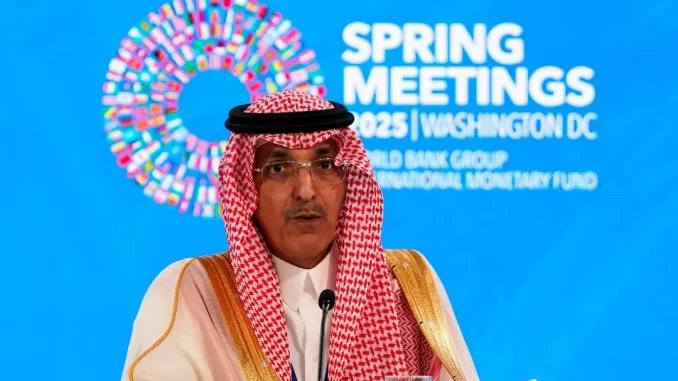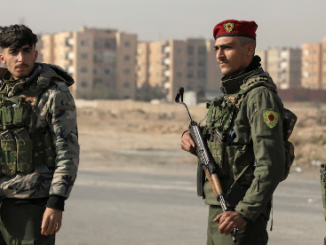
International Monetary and Financial Committee (IMFC) Chair, Saudi Finance Minister Mohammed Al Jadaan speaks at an International Monetary and Financial Committee press briefing at the 2025 annual IMF/World Bank Spring Meetings in Washington, DC, US, April 25, 2025. / Reuters
| Published April 28, 2025
In a significant diplomatic and financial development, Saudi Arabia and Qatar have jointly agreed to settle Syria’s outstanding debt of approximately $15 million to the World Bank. This move, announced during the recent World Bank and International Monetary Fund (IMF) spring meetings in Washington, D.C., is poised to unlock international financial assistance for Syria, marking a potential turning point in the nation’s post-war recovery efforts.
The settlement of Syria’s arrears is expected to facilitate the resumption of World Bank operations in the country, which had been suspended for over 14 years due to prolonged conflict and instability. The financial support aims to aid in rebuilding critical public sectors and infrastructure devastated by years of civil war.
This initiative represents the first known instance of Saudi financial aid to Syria since the ousting of former President Bashar al-Assad by Islamist-led rebels in late 2024. The new Syrian government, formed by former rebels from the Islamist group Hayat Tahrir al-Sham, has been seeking to rebuild diplomatic and financial relations internationally.
The joint statement by Saudi Arabia and Qatar encourages other international and regional financial institutions to resume and expand their support for Syria. The repayment will enable Syria to access immediate financial assistance aimed at rebuilding critical public sectors in the war-torn country.
Syria’s Foreign Ministry expressed gratitude for the move, noting it paves the way for cooperation in recovery and reconstruction efforts after a 14-year civil war that took around 500,000 lives and devastated infrastructure.
As the international community watches closely, the settlement of Syria’s debt to the World Bank by Saudi Arabia and Qatar may signal a new chapter in the region’s efforts to stabilize and rebuild after years of conflict.
Here are the implications of Saudi Arabia and Qatar paying off Syria’s World Bank debt:
1. Syria’s Reintegration into the Global Economy
-
Clearing the World Bank debt reopens access for Syria to international funding and development programs.
-
Syria can now apply for new loans, aid packages, and infrastructure grants that were previously blocked.
2. Strengthened Gulf Influence Over Syria
-
Saudi Arabia and Qatar, by financing Syria’s debt, gain political leverage over the new Syrian government.
-
They are likely to shape Syria’s reconstruction, economic policies, and regional alignments in their favor.
3. Shift in Regional Power Dynamics
-
This move signals a new era of Gulf-led diplomacy, where Arab states solve regional crises independently, reducing Western dominance in Middle East reconstruction efforts.
-
Iran’s influence over Syria could face competition from Gulf states.
4. Potential for Regional Stability
-
Financial reconstruction efforts may reduce instability, curb refugee flows, and diminish the appeal of extremist groups in Syria.
-
A more stable Syria could help stabilize neighboring countries like Lebanon, Jordan, and Iraq.
5. New Economic Opportunities
-
Global companies, especially in construction, energy, and telecoms, may eye investment opportunities in Syria’s rebuilding.
-
Gulf-backed reconstruction could fast-track projects in critical sectors like roads, power grids, hospitals, and schools.
6. Diplomatic Normalization Trend
-
More Arab and Muslim-majority countries could now follow Saudi Arabia and Qatar’s lead in normalizing ties with Syria.
-
Future Arab League cooperation with Syria looks increasingly likely.
Overall Takeaway:
The decision by Saudi Arabia and Qatar to settle Syria’s World Bank debt marks a major turning point in the Middle East’s post-conflict landscape. It not only unlocks international funding for Syria’s reconstruction but also signals a strategic shift where Gulf powers assert greater control over the region’s recovery, sidelining traditional Western influence. As Syria reopens to global financial systems, the move could pave the way for broader regional stability, economic revival, and a new phase of Arab diplomacy rooted in pragmatism and rebuilding.





Be the first to comment